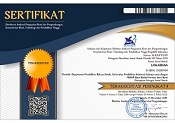The Values of Local Wisdom in Wawacan Pandita Sawang Manuscripts
Abstract
Abstract: Local wisdom is believed to be a form of internalization of the values embraced by a particular society or community, which are maintained and disseminated from generation to generation, both through oral and written traditions, one of which is through Wawacan Pandita Sawang manuscripts. Employing a qualitative descriptive approach and philological methods, this study is aimed to explore the values of local wisdom contained in the ancient Sundanese manuscripts. The results showed that the local wisdom recorded in the ancient manuscripts has long been lived and practiced by the people, so that it has formed the character of Sundanese people in carrying out their lives, especially those related to the relationship between humans and God, humans and humans, and humans with their environment. Therefore, the study of this manuscript will reopen and at the same time revitalize the values of local wisdom that once lived in Sundanese society as a comparison to develop values of the present time.
Keywords
Full Text:
PDFReferences
Alwasilah, A. C. (2009). Etnopedagogi. Bandung: Kiblat.
Arisandi, I. B. (2015). “Kritik Teks dan Tinjauan Kandungan Isi Naskah Wawacan Pandita Sawang”. Skripsi. Program Studi Bahasa dan Sastra Indonesia Universitas Pendidikan Indonesia: tidak diterbitkan.
Ayatrohaedi. (1986). Kepribadian Budaya Bangsa (Local Genius). Jakarta: Pustaka Jaya.
Baried, S. B. (1994). Pengantar Teori Filologi. Yogyakarta: Badan Penelitian dan Publikasi Fakultas, Universitas Gadjah Mada.
Danasasmita, S. dkk. (1984). Sejarah Jawa Barat. Bandung: Proyek Penerbitan Buku Sejarah Jawa Barat.
Darsa, U. A., dkk. (1993). Wawacan Gandasari. Jakarta: Direktorat Jenderal Kebudayaan, Depdikbud.
Ekadjati, Edi S. (1988). Naskah Sunda: Inventarisasi dan Pencatatan. Bandung: Universitas Padjadjaran.
Ekadjati, Edi S. & Darsa, U. A. (1999). Katalog Induk Naskah naskah Nusantara Jilid 5A Jawa Barat Koleksi Lima Lembaga. Jakarta: EFEO dan YOI.
Ekadjati, Edi S. (2000). Direktori Edisi Naskah Nusantara. Jakarta: Manassa dan YOI.
Ikram, A. (1997). Filologia Nusantara. Jakarta: Pustaka Jaya.
Koswara, D. (1995). Transliterasi Wawacan Buana Wisesa Koleksi Museum Geusan Ulun Sumedang. Bandung: tidak diterbitkan.
Koswara , D., Dallyono , R., Suherman , A., & Hyangsewu , P. (2021). The Analytical Scoring Assessment Usage to Examine Sundanese Students’ Performance in Writing Descriptive Texts. Jurnal Cakrawala Pendidikan, 40(3).
Robson, S. (1988). Principles of Indonesian Philology. Dordrecth Holland: Foris Publications.
Suherman, A. (2017). Wawacan Pandita Sawang sebagai Naskah Keagamaan: Tinjauan Kedudukan dan Fungsi. Manuskripta, 7 (2), 34-48.
Suherman, A. (2019). Literacy Tradition of Sundanese Society-Indonesia. International Journal for Innovation Education and Research, 7(3), 262-271. https://doi.org/10.31686/ijier.Vol7.Iss3.1377.
Sutana, K. (1986). “Analisis Struktur Wawacan Pandita Sawang dari Kecamatan Tomo Kabupaten Sumedang”. Skripsi. Program Studi Bahasa dan Sastra Sunda. Universitas Padjadjaran: tidak diterbitkan.
DOI: https://doi.org/10.17509/jlb.v12i2.40613
Refbacks
- There are currently no refbacks.
Copyright (c) 2021 LOKABASA

This work is licensed under a Creative Commons Attribution-ShareAlike 4.0 International License.

This work is licensed under Creative Commons Attribution-ShareAlike 4.0 International License.










